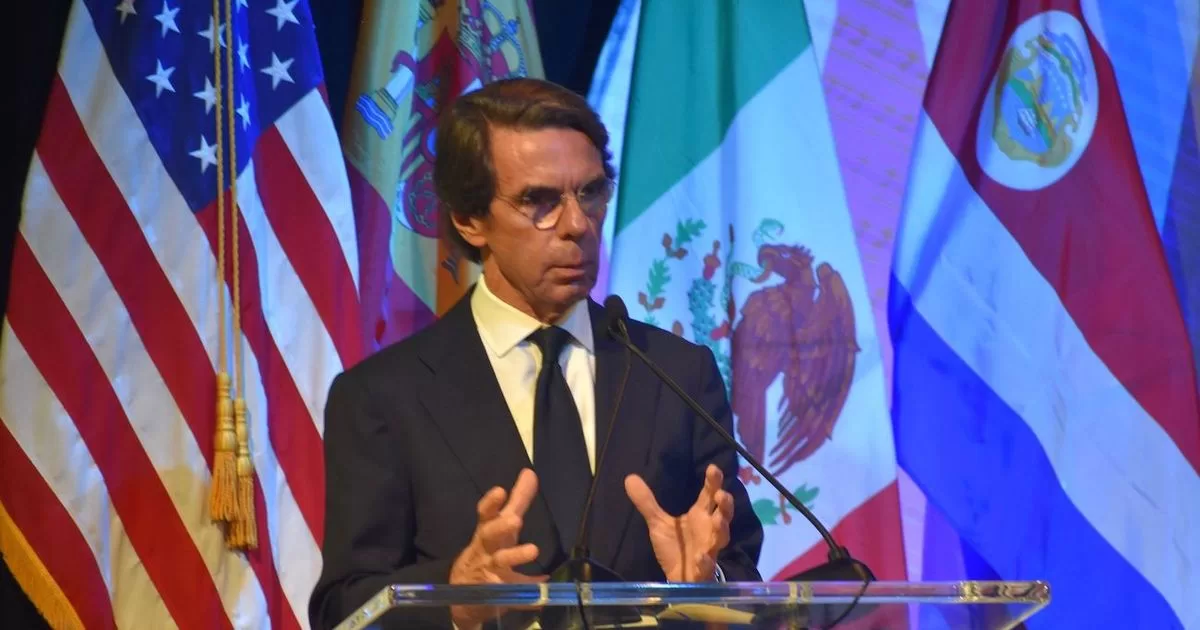“It is essential that Israel wins this war and ends it well,” declared the former president of the Spanish government and president of the Foundation for Analysis and Social Studies (FAES), José María Aznar.
The point was made by Aznar at the inauguration, this Monday, of the second day of the cycle “Keys of our time”, organized jointly by FAES and the Atlantic Institute of Government, which Aznar also chairs, with the theme: “The war in Ukraine and its relationship with the crisis in the Middle East”; The forum aims to obtain a more precise knowledge of the new international environment.
“It is not just about ending Hamas, but about guaranteeing security conditions for the future and, obviously, advancing regional security processes,” Aznar said, adding that if Israel does not win this war, “the next war would be on the borders close to Europe and within them, on the weakest borders that Europe has.”
José María Aznar is a Spanish politician with a conservative and pro-Israeli ideology. He has been a staunch defender of Israel since his time as President of the Spanish Government, between 1996 and 2004.
In this statement, Aznar referred to the ongoing war between Israel and Hamas, the latter is the terrorist group that controls the Gaza Strip and that on October 7 carried out a strong armed attack against Israel, in response, the Israeli government He formally declared war the next day, authorizing significant military action against the Palestinian militant group.
Aznar believes that Israel’s victory is necessary to guarantee Israel’s security and the stability of the region.
The growing challenge
The former head of government argues that if Israel does not win the war, Hamas will be reinforced and it will be more difficult to negotiate a lasting peace. He also believes that Israel’s victory could deter other terrorist groups from attacking Israel.
However, world analysts maintain that if the war in Gaza does not force the Israelis, the Palestinians and their powerful friends to try again to make peace, then the only future will be more war.
The former president explained that one of the essential elements of what is happening in the world is that “autocracies – such as China, Russia and Iran – trust less and less in the deterrence capacity of the United States and its reliability is increasingly less, Therefore, the challenge is increasing.”
He recognizes that the world would greatly appreciate if “the US were able to overcome the lack of consistency and insecurity, the lack of deterrence that, for years, has been accumulating in North American policy.” However, Aznar is not optimistic about this given the country’s electoral outlook.
On the other hand, José María Aznar shows his disagreement with the Government’s decision not to act militarily in the Red Sea. “Spain expresses a truly relevant iron will in defense of maritime security, we alone risk almost 200,000 million annually in the Spanish economy,” he says ironically.
At another point in his speech, the former president who, in his words, remains a convinced Atlanticist, wanted to focus on the need for Europe to rethink its objectives. “Europe is committed to a review of objectives that make it viable.”
The EU has to review its security and defense commitment
He highlights that the European Union has to review its security and defense commitment within NATO and with the US. “We cannot continue in a needy state when that is a capital issue in today’s world,” said Aznar.
The former president considers that from the point of view of competition, Europe has to grow economically more and compete economically better. “The technological path is largely lost, but it can regain ground in competition and growth.”
He also believes that advantageous elements for European internal life must be facilitated, such as the development of the single market, and it must be realized that excess regulation suffocates European business and European possibilities.
Aznar asked himself in his speech, What do we Europeans do with the demographics that we have with migration policy?
Finally, he insisted that democracies “need strong institutions” that are not questioned and “a strong rule of law that works” and that does not weaken.
“Today, democracies are facing a very big crisis due to the uprooting of institutions, insecurity and corruption, and the fragmentation and confrontation of societies. In my opinion, to a large extent, it is a consequence of the technological revolution,” he suggests.
The democratic world must be tougher
Analysts consider it evident that the democratic world has to be much tougher. Show that kindness also has fists. They assure that the weak reaction of the West to everything that Russia did (first in Georgia, and since 2014 in Ukraine, finally leading to a direct invasion and Africa that began a series of coups d’état, again, not without Russian traces, and now the Middle East is also exploding.
They claim that it is clear that the Palestinian-Israeli conflict has its roots. But the fact that it has escalated again right now is a consequence, among other things, of the weakness of the West’s response to Russian aggression.
(email protected)
Source: Account of the social network X, formerly Twitter of the former president of Spain JM Aznar, FAES Foundation

